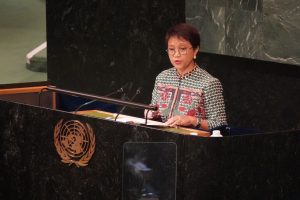Indonesia’s foreign minister delivered a forceful address to the United Nations General Assembly in late September. That week, media speculation on the war in Ukraine going nuclear reached a fevered pitch, and there was little coverage of Retno’s remarks in the international media. With Bali preparing to welcome a high-powered gathering of world leaders, the salient points in her speech merit a closer look.
Indonesia hopes that the November 15-16 summit will be a turning point for the global economy. Retno’s task at the U.N. was to set a high bar while managing expectations. Her message was simple: “G-20 must not fail.” Food and fuel shortages, she conceded, had dampened prospects for a post-pandemic recovery. She also reminded her audience that the stakes were high: “We cannot let global recovery fall at the mercy of geopolitics.”
A new challenge for the G-20 emerged this past weekend. Russia pulled out of a U.N.-backed grain deal after a drone attack on its naval fleet in Sevastopol. The price of wheat is expected to soar in international commodity markets. A diplomat familiar with the agreement told Reuters that the grain deal would likely be the “centerpiece” of G-20 negotiations.
The second half of Retno’s speech was devoted to tensions in the South China Sea. She was especially concerned that “mini-lateral” groups had become part of “a proxy war between major powers.” By disrupting regional stability, these small alliances undermined the authority of stalwarts like the Association of Southeast Asian Nations (ASEAN). Speaking on behalf of the bloc, which Indonesia chairs this year, the foreign minister asserted: “we refuse to be a pawn in a new Cold War.”
The offending mini-lateral was not named. But the target of the foreign minister’s pointed remarks was obvious. AUKUS, the trilateral pact between Australia, the United Kingdom, and the United States, has both unnerved and reassured policymakers in Southeast Asia ever since its inception a year ago.
One polarizing issue for ASEAN’s maritime countries is Australia’s decision to build nuclear-powered submarines under the AUKUS umbrella. The Philippines, Singapore, and Vietnam have, by and large, supported the decision as a positive development for regional security. Thailand made no official comment. But Malaysia and Indonesia were vocal about their misgivings. In a joint news conference with her Malaysian counterpart last year, Retno expressed fears about a growing “arms race.”
Indonesia’s unease over “mini-laterals” was noted in Beijing. In July, Joko “Jokowi” Widodo, Indonesia’s president, visited China and invited Xi Jinping to the G-20 summit. In a joint statement, China reaffirmed its support for multilateralism and “ASEAN centrality.” China also offered to help develop the country’s new capital, Nusantara. Xi’s enthusiastic support for the G-20, ASEAN, and infrastructure projects was a vote of confidence in Indonesia’s regional leadership. A Jakarta Post editorial waxed lyrical, “Jokowi has extended the people’s xie xie – Mandarin Chinese for ‘thank you’ – message to Xi.”
“ASEAN centrality” is an oft-repeated buzz phrase in Southeast Asian diplomacy. But lately, the 55-year-old alliance has been relegated to the periphery on multiple issues. “ASEAN as we know it may have run its course,” said Thitinan Pongsudhirak, a political scientist at Bangkok’s Chulalongkorn University. AUKUS was a “wake-up call” on regional security, noted a leading Singapore think tank. Myanmar is another stumbling block. In her U.N. speech, Retno signaled her frustration, saying ASEAN did not want to be “taken hostage by the situation in Myanmar.” One solution to the dysfunction is for the bloc’s member-states to form some “mini-lateral” alignments of their own, in order to forge ahead of key issues of mutual interest.
Retno gave no indication that Indonesia was moving in that direction. Her speech reinforced the idea of “ASEAN’s centrality” guided by a “new paradigm” of collaboration. Rather than signaling a strategic shift, however, the “new paradigm” appears to be a reassertion of the country’s long-standing position of neutrality. Author and Jokowi biographer Ben Bland wrote that Indonesia’s foreign policy is best understood as a “reflection of domestic politics” and of the President’s preference for practical, incremental change over bold strategy.
How will the “new paradigm” play out at the G-20? The foreign minister’s plea to approach the summit in a spirit of cooperation is a good start.

































